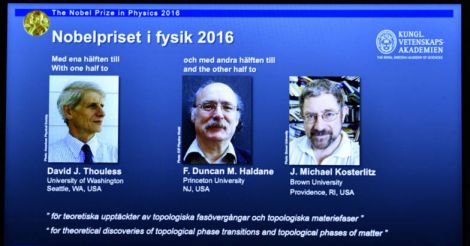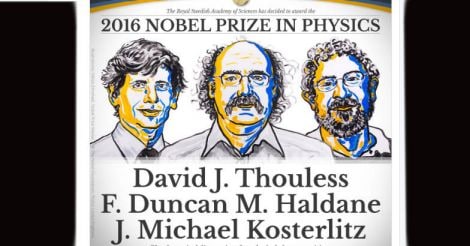British-born scientists David Thouless, Duncan Haldane and Michael Kosterlitz on Tuesday won the 2016 Nobel Prize for Physics for studies of unusual states of matter such as in superconductors.
"Thanks to their pioneering work, the hunt is now on for new and exotic phases of matter," the Royal Swedish Academy of Sciences said in a statement awarding the 8 million Swedish crown (734,772 pound) prize. Thouless was awarded half the prize with the other half divided between Haldane and Kosterlitz.
"Many people are hopeful of future applications in both materials science and electronics."
 A overhead projector displays the photos of the winners of the Nobel Prize in physics, at the Royal Swedish Academy of Sciences, in Stockholm, Sweden, Tuesday. Photo: AP
A overhead projector displays the photos of the winners of the Nobel Prize in physics, at the Royal Swedish Academy of Sciences, in Stockholm, Sweden, Tuesday. Photo: APThe three "opened the door" to an unknown world where matter takes unusual states or phases, the Royal Swedish Academy of Sciences said.
They were for their "theoretical discoveries of topological phase transitions and topological phases of matter."
Thouless, 82, is a professor emeritus at the University of Washington. Haldane, 65, is a physics professor at Princeton University in New Jersey. Kosterlitz, 73, is a physics professor at Brown University in Providence, Rhode Island.
Their research was conducted in the 1970s and '80s. Nobel judges often award discoveries made decades ago, to make sure they withstand the test of time.
Physics is the second of this year's crop of Nobels and comes after Japan's Yoshinori Ohsumi was awarded the prize for medicine on Monday.
(With agency inputs)
























